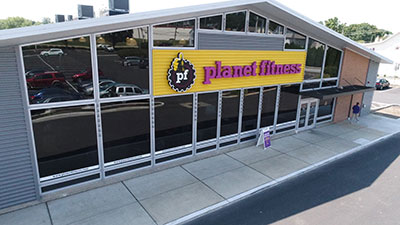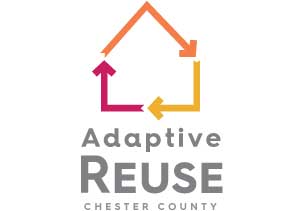Adaptive reuse creates an option, other than demolition, for buildings that have outlived their original purpose.
What is Adaptive Reuse?
We asked members of our Advisory Committee to rethink the definition of Adaptive Reuse and the collaboration resulted in the following: Adaptive Reuse is the process of creatively repurposing buildings for another use or function while retaining their historic, unique, or defining architectural features. Adaptive reuse maintains a building's vitality, provides for economically viable new uses, creates tax revenue, and provides expanded development opportunities while preserving buildings, maintaining community character, and providing links to the past. The process supports historic preservation. Andrea Campisi, East Bradford Township assistant manager believes "historic structures have a character that you just don't see in new construction." A character that defines Chester County's neighborhoods, communities, and towns.
While adaptive reuse is more commonly associated with the preservation of historically valued or architecturally significant buildings, it also provides renewed vitality to more commonplace or modern buildings that may be underused, vacant, or functionally obsolete.
Types of adaptive reuse range from converting industrial buildings to apartments, houses to banks, schools to municipal buildings, and commercial buildings to retirement homes. One of the most familiar types of reuses is residential conversion from a single-family dwelling into two or more units, provisions are included in many municipal zoning ordinances. A key component of any reuse is that it is undertaken with sensitivity to a building's character-defining features; this lends to the project's uniqueness, and often its success and marketability. Other important factors include finding a market niche, providing a mix of uses, identifying risk factors early on, and taking a collaborative approach.
Residential conversion changes a building from its current use (commercial, industrial, institutional, single-family residential) into a new or different type of residential use, for more on residential conversion see the Chester County Planning Commission eTool on Residential Conversion.
Advantages
Adaptive reuse of buildings can provide benefits.

The adaptive reuse of a former ACME Market in Parkesburg Borough inspired a façade update to the shopping center benefitting consumers and the community at large.
- Preserve the built environment and give renewed life to a building. Successful adaptive reuse can contribute to and is generally more compatible with, community character than new construction. Adaptive reuse creates an option other than demolition for buildings that have outlived their original purpose.
- Contribute to the economic health and revitalization of a community by generating a better use for structures that might otherwise be vacant or underutilized. Revitalizing through adaptive reuse can lead to infill development of unused or underutilized land in urban areas. It can create employment opportunities and revenue-generating development and increase housing stock.
- Expand development opportunities, serve as an alternative to new construction, save demolition costs, and create unique opportunities using existing infrastructure.
- Save time in the development process if the new use conforms to existing zoning. Approval and permitting can be less expensive and processed more quickly than in new development. Although physical rehabilitation may be challenging, it is generally shorter since the basic structure and infrastructure are already in place.
- Aesthetically appealing features and architectural elements, such as high ceilings and brickwork, in existing buildings, can increase market value. Materials and quality of construction of the past are generally not economically feasible to reproduce today.
- Adaptive reuse of a building minimizes the need for new materials and reduces the carbon footprint associated with their production and transportation.
Challenges
The following challenges may be associated with adaptive reuse projects and suggested solutions to overcoming those challenges are addressed in the following sections.
- Zoning may limit uses which could restrict reuse opportunities. Provisions, such as off-street parking requirements, for a new use may be difficult for an existing building to meet.
- Local building code requirements, generally designed for new construction, may be difficult or impossible to apply to an existing building.
- Structural constraints and retaining aesthetically appealing, architectural, and historic features may make fitting a use into an existing building challenging and require creativity and flexibility.
- The presence of environmental contaminants, such as asbestos, are found in many existing buildings. However, these are commonly identified and evaluated as part of a project feasibility analysis (discussed in detail in the Getting Started section).
- Securing financing is often one of the greatest challenges. Lending institutions may be wary of adaptive reuse projects, a contingency fund is frequently required, therefore reuse projects are usually funded through a combination of sources.
Legal Basis
The Pennsylvania Municipalities Planning Code, Act 247, enables municipalities to establish land use controls, such as zoning, that can accommodate reuses and conversions. Specifically, Article VI authorizes use of zoning to regulate "places having unique historical, architectural, or patriotic interest or value." References throughout Act 247 indicate that historic preservation is a valid consideration in local planning and regulation.


